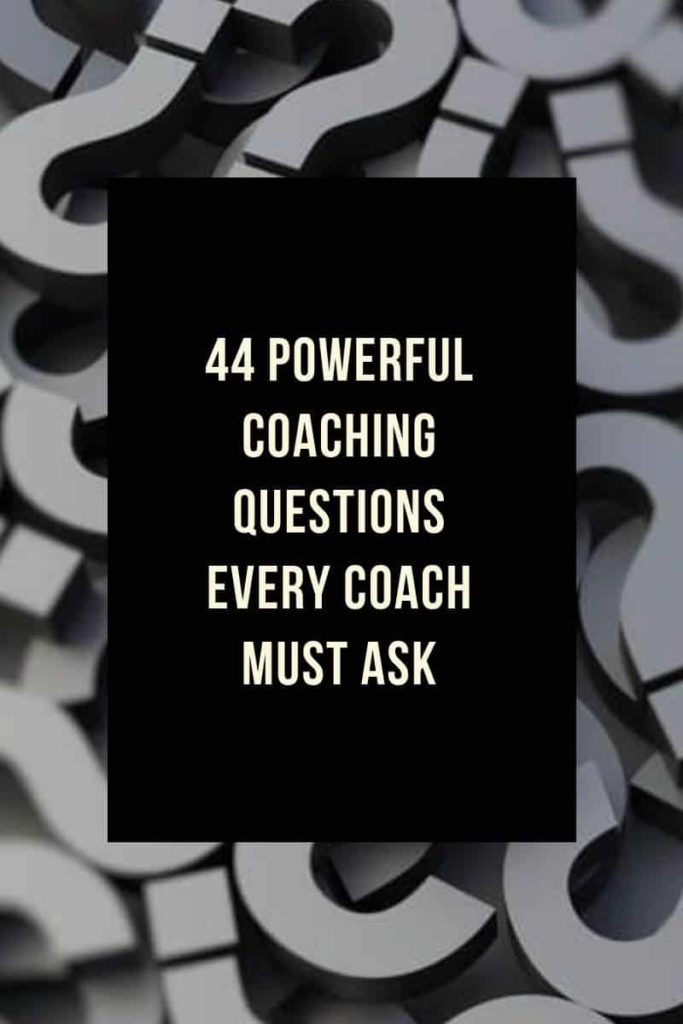A consultant will not supply the answers to your queries; instead, the consultant will guide you to find your own. To accomplish this, you must ask many compelling questions, similar to those that consultants must ask.
At times, it’s necessary to offer a fresh perspective, thereby facilitating the necessary shift for success. This is why the skill of consulting is critical.
If the appropriate collection of questions is asked at the appropriate time and in a suitable manner, it can yield some significant insights. The client may learn things about himself and his situation that were previously unknown to him.
I’ve developed a list of one-on-one consultation questions that will undoubtedly assist you in putting yourself in your client’s shoes.
1. What do you aspire to achieve by the end of this session?
I’m going to pose this question immediately upon the start of my meeting.
It helps me and my client stay on the same page. It ensures that clients receive additional benefits from the session and that it is worth paying for.
2. What matters most in your life?
Numerous consultants make the error of focusing exclusively on the source of the problem. To begin, it’s critical to gain an insight into your client’s life.
This will enable you to comprehend his whims and fancies. It is possible to follow up with inquiries such as “Why is this so important to you?” or “How does it strengthen you?”
When you ask these questions, the client becomes more calm and receptive. This assists you in identifying the problem and proposing remedies.
3. What is your daily routine?
This may seem trivial, but it is critical.
When your client discusses his daily routine with you, he provides you with indirect information about his priorities, time management abilities, work and personal life balance, etc.
4. What is your biggest strength and weakness?
Image from unsplash.com
This is one of the most critical consultation questions and should be at the top of your list.
By identifying the client’s strengths and shortcomings, you may determine the customer’s type of person.
Suppose the customer is experiencing difficulties in his relationship. He informs you that his most excellent skill is his penchant for swiftly apologizing for his errors. He also informs you that his occasional inability to control his temper is his weakness.
As a result, you could deduce that the client loses his anger frequently, which has a detrimental effect on his life. Additionally, he must continuously apologize for the errors that contributed to his low self-esteem.
5. Which of your strengths become your limitation when you exercise it too much?
For instance, if your customer excels at working hard, but much of this is impacting his work-life balance, This is the point when things start to go wrong.
6. What is your ultimate goal in life?
It is critical to understand the customer’s greatest passions.
For instance, someone may be frustrated by his current circumstances and want fulfillment and harmony. Understanding this and the accompanying set of questions to ask will help the individual achieve their goals.
7. How committed are you to your goal?
The client’s responses should structure your consultation questions.
After you’ve inquired what he’s been up to, the following query must be regarding his devotion to it.
It is preferable to conduct the session as a conversation rather than an interview if your customer indicates that their dedication has waned in recent months, attempt to ascertain why.
8. What does your intuition tell you about this goal?
Image from Pixabay.com
This demonstrates the client’s emotions and his commitment to achieving the desired outcome. If he demonstrates a firm conviction, he can accomplish it. Ensure that you construct the course specifically for him.
If he indicates that he is having problems accomplishing the goal, your next step should be to ascertain why.
9. If You Could Change One Thing About Your Objective, What Would It Be?
Are you dragging your client in unnecessarily? His body into a position he does not wish to be in?
This question can assist you in comprehending the situation.
10. What Distinguishes You From Others?
Assist your client in establishing their distinctiveness. Bear in mind that your client may be disoriented or underestimating herself.
Your mission is to reawaken in him the spirit of hope and passion.
He must identify his unique personality trait!
11. What Resources Are Available to You?
Numerous people are conditioned to focus exclusively on the bad parts of their lives. Additionally, they cannot appreciate the benefits of the possessions they own.
This is an excellent consultative question because it demonstrates to your client that while there are hurdles along the way, there are also beneficial instruments that he may not be utilized to their full potential.
12. How Would You Describe Yourself to a Best Friend?
This may appear to be an entirely unrelated matter. However, I believe that viewing oneself through the eyes can significantly affect us.
It’s an excellent technique to recognize one’s worth and identify one’s errors.
13. What Are You Afraid I Will Ask You?
I would propose that you pose this question jocularly! This will assist you in identifying the portion of the conversation that your client is attempting to avoid and is unwilling to discuss.
It’s more than probable that he’s delaying the concept or is unwilling to allow you to enter that zone. It would be best if you now devised an intelligent strategy for determining the cause.
14. What is the current most significant challenge that you are facing?
Image from Pixabay.com
Occasionally, there is only one cause, and the others are simply by-products.
The objective is to identify the most significant impediment through one-on-one consultation questions.
15. What Are Your Most Urgent Needs Right Now?
Your client can be assisted in prioritizing. Request that he review your questions to ascertain what he is truly looking for.
Encourage him to delve deeper into his soul and communicate his biggest aspiration with you.
At times, we are unaware of our requirements.
For instance, your customer may assert that he needs to accelerate the pace of his business. However, you’ll discover that he is unsupported and in need of motivation.
16. What Is Your Definition Of Success?
My favorite song. As we age, the thrill of fantasizing diminishes.
The query may assist your customer in realizing previously unknown desires. The client will begin to express his desires from a place of passion.
17. What Are You Proud Of?
If you ask your customer a question, it will remind him of his accomplishments and instill confidence.
This serves to emphasize your worth and aids in identifying it.
18. Who Are The Key Members Of Your Support Network?
Are they surrounded by a robust support network within his network? If not, is this the primary reason you cannot progress quickly? This must be determined.
19. Where Are You On A Scale Of 1-10?
I enjoy repeating this question twice. This was the first time at the start and the second time at the conclusion.
This is because your client may initially be unaware of his circumstances or himself. However, with time and the advice you supply via your particular consultation questions, he will get better knowledge.
He may be aware of the benefits and worth, boosting his grade from a four to an eight by the conclusion. This would undoubtedly be an incredible victory!
20. What Is Obstructing Your Progress?
Careers and life are fraught with stumbling blocks and difficulties. The issue can occur in various settings, both professional and personal.
This question might initiate the brainstorming process and assist you in gaining a broader view of the topic.
21. Have You Ever Faced A Similar Situation?
If the client responds “yes” to this, then the method of resolving the issue must undoubtedly change.
If the answer is “no,” the moment has come to tighten your belt and begin analyzing the situation, determining the pertinent concerns, and making recommendations.
22. What have you done to solve the problem?
Image from Pixabay.com
After the client has outlined the issue, the next question is, “What other solutions have you attempted?”
When a client is given adequate time and effort, the other way should be examined. Perhaps a novel technique is required in this situation.
You may eventually be able to inquire further, such as “How come you couldn’t succeed the first time?” “What did you do differently on your subsequent attempt”? Etc.
23. What Setbacks Have You Met And What Have You Learned From Them?
Your consultation questions aim to ascertain your clients’ current state of affairs. Following that, you can assist him in determining which decisions were made incorrectly and what actions should be taken to address them at this moment.
The difficulties that arise when I encourage my clients to share the lessons they’ve learned help them develop a greater sense of self-confidence.
Consider the following scenario: a customer discloses that he was charmed by his buddy. He has now recognized the need to maintain his partner’s privacy.
This is the time to express gratitude to your client and compliment him on a well-done job!
Your client will gradually develop a more accurate perception of himself. Then you can instruct him on how to apply it. Similar practices, like checking your partner’s phone, must be minimized.
24. What Is Effective?
There are numerous alternatives, and in addition to the difficulties, some things work well. However, your client is unable to identify the issue.
It is critical to educate the individuals you serve that while the situation could be worse, it is not at the moment. Ask “What is the worst-case scenario?” and picture an even more dreadful scenario to demonstrate to the client that the current situation is not as awful as it appears.
25. Where Do You Want To Be Five Years From Now?
Allow your client to fly to his destination. Thank him for his good suggestions, such as “Awesome, that’s fantastic!” ” I admired your spirit.”
Have faith in him; he will undoubtedly accomplish similar feats shortly.
26. How Would You Advise A Friend In A Similar Situation?
Giving advice is far easier than attempting to apply it!
If you ask this question while advising a buddy, the advising person may discover some beneficial suggestions for themselves.
27. What Would You Do If The Circumstances Were Favorable?
I enjoy providing this digital experience to my consumers to assist them in seeing the barriers they’d like to conquer and the goal they’d like to reach.
Now, your client’s impression of the situation is uncertain. Allow him to simplify the matter.
You may make it interactive by asking questions such as “What would you do if all of your resources were suddenly depleted?” “What if I also accomplish that?”
It is critical to obtain the final mile that your consumer desires. Throughout the course, you’ll need to take note of the genuine challenges at hand and then decide what can be done to improve the situation.
28. If things go exactly the way you want in the next five months, what would you see?
Image from Pixabay.com
Visualization is a powerful technique.
This enables your customer to think beyond the present moment and achieve tranquillity.
29. What Would You Have Done Today If You Were The Bravest Version Of Yourself?
The client is unavailable. He asserts that the customer is prepared to surrender and is acting cowardly.
When I am working with a client in anguish and despair, I attempt to convince him to adopt the appearance of his ideal self and then propose that he follow through on the subsequent acts.
This enables him to recognize his daring and positive qualities.
30. What Alternatives Are Currently Available?
The overwhelming majority of individuals are caught in this place, believing there is no way out.
As consultants, your responsibility is not simply to provide possibilities but to allow the client to create their own.
It is critical to exercise caution when responding to queries.
For instance, when a client expresses dissatisfaction with a coworker, instead of responding, “How could he do this to you?”
It is preferable to phrase it as follows: “What might have possibly motivated his actions?” “How can we improve our relationship by dealing with him?”
31. Which Of Them Do You Consider To Be The Best And Why?
Great! Your client is now aware of the appropriate course of action. Your advice will undoubtedly benefit the client!
The following step is to allow your client to make the best selection. “Why” is critical in this instance. If you suspect he is avoiding an appropriate decision because of his assumptions or insecurities, you can ask, “Why not?”
Assure that the tone of your letter is more suggestive than rude.
32. What Is The Worst-Case Scenario If You Fail Once More?
Planning for the worst will take care of the other automatically.
The difficulty is that your client is most scared of this “worse.” Once you better know that, you must persuade your client that it is not as horrible as he imagines and that we can work together to overcome it.
Ask him, “So what do you think?” and explain how this will not affect him as negatively as he is currently thinking.
33. If I were to tell you that three of your wishes would come true right now, what would they be?
Pixabay.com image
Your client’s desires must be able to be prioritized. With this inquiry, you attempt to persuade the client that not everything will go according to plan.
What are the first three things he’d want if given a chance?
34. What Are Three Sense-Making Actions That You Can Take This Week?
The time has come to act. The client has a strategy. He must now carry out the same plan through action.
It’s a good idea to urge your client to begin by setting small goals gently; if those are met, you can go on to greater ones.
Inquire of your clients about what they celebrate when their actions result in the intended results. Celebrations are necessary!
35. If You Could Undo One of Your Actions, What Would It Be?
According to psychology, sometimes reversing an incident and then picturing it how you like can provide enormous serenity.
This will also enable you to ascertain the primary issue affecting your client.
36. What Are You Avoiding to Accomplish Your Objective?
This is an excellent question. It supports the client in seeing that he is always making choices and trying to make his aspirations a reality.
Whatever the cause, if it is ineffective, the consultant’s responsibility is to acknowledge the client’s daily efforts and recommend strategies to maximize results.
37. Have Any Critical Questions Gone Unasked?
This question conveys that you are committed to assisting your client but are not in a hurry to complete the transaction.
As an expert, you must always prioritize relationship-building over the business.
38. What Was Today’s Biggest Victory?
I always ask that question in conclusion. It enables me to comprehend my clients’ primary concerns.
Additionally, it assists clients in appreciating the worth of my consulting session and how it benefitted the space created.
39. Can I Expect You To Return In The Event Of A Need?
This is one of several ways to determine the worth of your consulting meeting.
If the answer is “YES,” you did an excellent job, and the individual may also promote your services to a couple of his friends in the future.
Additionally, it is possible to have specific unique, and practical consultative questions, such as the following:
40. Assist Me in Comprehending…
41. Inform Me A Little More About That…
42. Could You Describe Me a Little More…
43. Allow Me to Confirm That I Understand Correctly…
44. Could You Please Narrate Some Incidents That Support That…
These questions can assist you in developing an X-ray image of the client’s condition. Additionally, by asking these particular questions, you reassure your client that you are making every attempt to understand the full scope of his problem.
I hope I was able to impart some valuable knowledge to you!









![Mastermind Consulting: A Complete Guide [2022 Edition] powerful Consulting questions Mastermind Consulting: A Complete Guide [2022 Edition] powerful Consulting questions](https://consultantfoundation.com/wp-content/uploads/2019/11/Copy-of-consultant-36-150x150.jpg)
![The 5 Simple Steps for a Great Consulting Intake Form [2022 Edition] powerful Consulting questions The 5 Simple Steps for a Great Consulting Intake Form [2022 Edition] powerful Consulting questions](https://consultantfoundation.com/wp-content/uploads/2020/09/Copy-of-consultant-2020-09-25T022658.647-150x150.jpg)

Hi Can I have a copy of the powerful consulting question please? Thanks Ali
Hi Alison, I’d like to invite you to join the workshop. And get more details there